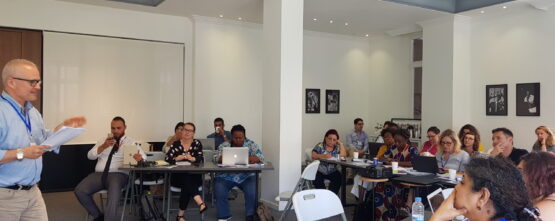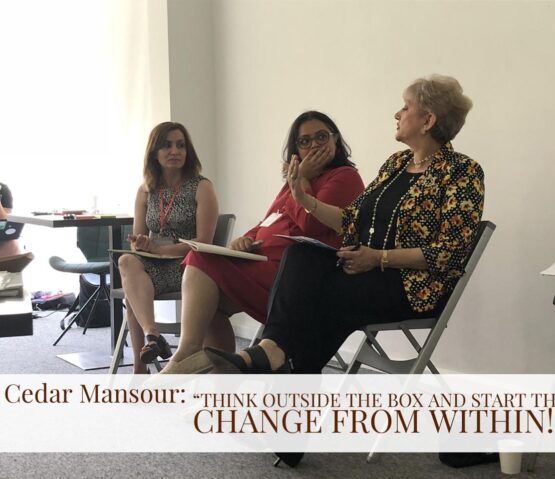Intersectionality & Social Justice
Professor Eugene Sensenig gave a training on intersectionality to the Funding Leaderships and Opportunities for Women (FLOW) recipients, who met to share the results of their work, challenges, and discuss future projects in June 2019 in Beirut.
Prof. Sensenig, introduced the history and contextuality of the intersectional approach to social science research and social justice activism. He then asked: “What does Internationality mean for me?” giving examples from his research in the fields of disabilities, ‘race’, religion, migration and refugees. He illustrated how gender overlaps with social class, sexual orientation, and disabilities in the field of sexual exploitation and violence against women and girls. Linking this to Men’s and Masculinities Studies, he dealt with research and activism related to GBV against male survivors with disabilities.
Referring to the issue of conflict, Prof. Sensenig pointed out that some conflicts can be solved and eliminated, such as racism-based oppression and exploitation, thus leading to ‘conflict resolution’. The tension and creativity generated by other conflicts, based for example on gender, disabilities, social class, or sexual orientation, will remain with us forever.
These conflicts should be transformed rather than resolved. Finally, he pointed out that we should all be aware of how working with conflicts directly affects us as activist, researchers, and humanitarian aid professionals. The concept of ‘affectedness’ (or standpoint theory) focuses on this direct link between the partners in any aid and development project.
Female Leadership
Professor Cedar Mansour expressed her gratitude for being in a room filled with people working on gender equality. Mansour announced that being a woman in many different leadership positions has been very inspiring and discouraging at the same time. She said: “as an academician I will approach this issue from a theoretical and applicable perspective.” She then added: “Barriers such as the glass ceiling and stereotypical mindset are still blocking women from reaching leadership positions. A recent study from 2018, published in Forbes Magazine, mentioned that woman in leadership positions are declining. Women in senior leadership positions dropped from 25 to 24 per cent, the female CEO positions dropped from 6 per cent in 2017 to 5 per cent in 2018.”
“These studies and numbers show that female leadership is not working as it should”, remarked Mansour. The real change that should happen will never be from the outside, it should start from within. Drafting bills and new laws is a very important process to eliminate discrimination in society or in the workplace. However, we are asked to raise our young girls to eradicate this inherited discrimination from their mindset and from within. “Personally, I grew up as an independent feminist and worked towards achieving these goals,” replied Mansour to one of the questions on how to raise girls.
She emphasized that there shouldn’t be a set of rules on acceptable behavior for girls and what is demanded of boys. The responsibility in the educational sector and in particular in higher education is huge. “Girls should not get in order to get married but to be able to fulfill their ambitions, expectations and needs. We should raise young girls to become women in an inquisitive culture and encourage them to ask questions, to trust themselves to speak up, to create a network of alliances, and to take charge in order to become leaders.”, Mansour concluded.


 This microsite is licensed under a Creative Commons Attribution-NonCommercial-ShareAlike 4.0 International License
This microsite is licensed under a Creative Commons Attribution-NonCommercial-ShareAlike 4.0 International License